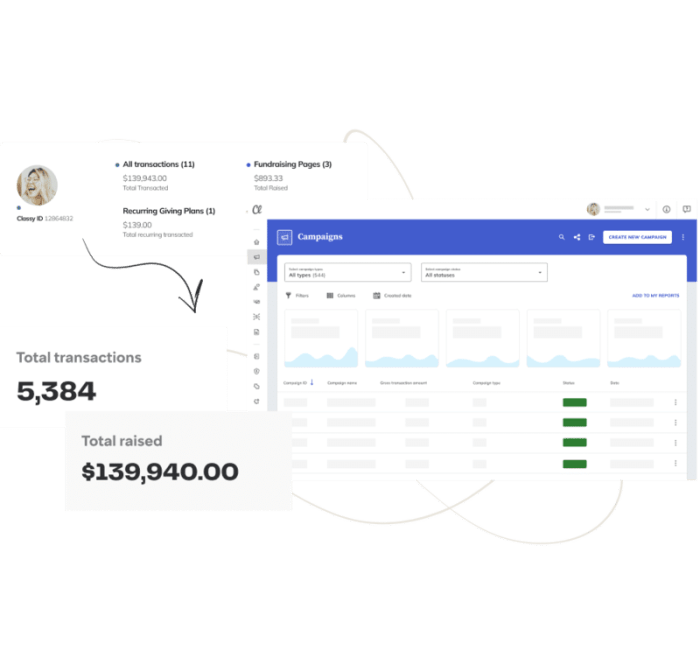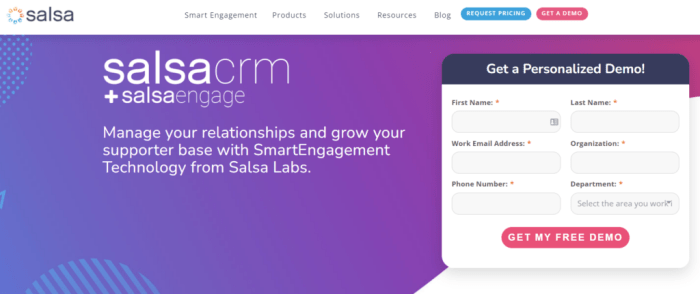Crm donor management software – In the increasingly competitive landscape of nonprofit fundraising, efficient donor management is paramount. Donor management software (DMS) has emerged as a crucial tool, streamlining operations and enhancing the overall donor experience. This comprehensive guide delves into the intricacies of donor management software, focusing specifically on its application for managing donor relationships and maximizing fundraising efforts. We’ll explore key features, benefits, selection criteria, and frequently asked questions to help you make an informed decision.
Understanding Donor Management Software (DMS)
Donor management software, also known as donor relationship management (DRM) software, is a centralized database designed to store and manage information about donors, volunteers, and other stakeholders. It goes beyond simple contact management, providing tools for tracking donations, managing fundraising campaigns, automating communications, and analyzing donor behavior to optimize fundraising strategies. A robust DMS system enables nonprofits to cultivate stronger relationships with their donors, leading to increased engagement and giving.
Key Features of Effective Donor Management Software, Crm donor management software
- Contact Management: Centralized storage and management of donor contact information, including addresses, phone numbers, email addresses, and social media profiles. This ensures data accuracy and consistency across the organization.
- Donation Tracking: Detailed record-keeping of all donations, including the date, amount, method of payment, and purpose of the donation. This allows for accurate financial reporting and donor recognition.
- Fundraising Campaign Management: Tools for planning, executing, and tracking the progress of fundraising campaigns. This often includes features for setting goals, managing pledges, and analyzing campaign performance.
- Communication Automation: Automated email marketing, personalized thank-you notes, and other communication tools to nurture donor relationships and keep them engaged. This can significantly improve efficiency and personalize outreach.
- Reporting and Analytics: Powerful reporting tools to analyze donor data, identify trends, and measure the effectiveness of fundraising efforts. This allows for data-driven decision-making and continuous improvement.
- Volunteer Management (Often Included): Many DMS systems include features for managing volunteers, tracking their contributions, and scheduling their activities. This streamlines volunteer coordination and enhances overall organizational efficiency.
- Grant Management (Sometimes Included): Some advanced systems incorporate grant management capabilities, helping nonprofits track grant applications, deadlines, and reporting requirements.
- Integration Capabilities: The ability to integrate with other software systems, such as accounting software and email marketing platforms, for seamless data flow and improved workflow.
Benefits of Using Donor Management Software
Implementing a DMS offers numerous advantages for nonprofits of all sizes. These benefits translate to improved efficiency, stronger donor relationships, and ultimately, increased fundraising success.
- Improved Donor Relationships: Personalized communication and targeted outreach foster stronger connections with donors, leading to increased loyalty and giving.
- Increased Fundraising Efficiency: Automation of tasks like donation processing and communication saves time and resources, allowing staff to focus on strategic initiatives.
- Enhanced Data Accuracy: Centralized data storage minimizes errors and ensures consistent information across the organization.
- Better Reporting and Analytics: Data-driven insights allow for informed decision-making and optimized fundraising strategies.
- Improved Compliance: Accurate record-keeping ensures compliance with legal and regulatory requirements.
- Streamlined Workflow: Automated processes and integrated systems improve overall operational efficiency.
- Enhanced Donor Retention: Proactive communication and personalized engagement contribute to higher donor retention rates.
Choosing the Right Donor Management Software
Selecting the appropriate DMS requires careful consideration of your organization’s specific needs and resources. Here are some key factors to consider:
- Size and Scale: Choose a system that can accommodate your current and projected number of donors and transactions.
- Features and Functionality: Identify the essential features that align with your fundraising goals and operational requirements.
- Budget: Consider the cost of the software, including licensing fees, implementation costs, and ongoing maintenance.
- Ease of Use: Select a system that is intuitive and easy for your staff to learn and use effectively.
- Integration Capabilities: Ensure the software integrates seamlessly with other systems you currently use.
- Scalability: Choose a system that can grow with your organization as your needs evolve.
- Customer Support: Look for a vendor that offers reliable and responsive customer support.
- Security: Prioritize a system with robust security features to protect sensitive donor data.
Popular Donor Management Software Options
The market offers a wide array of donor management software solutions, catering to diverse needs and budgets. Some popular options include:
- Blackbaud Raiser’s Edge NXT: A comprehensive solution for larger organizations with advanced features and robust reporting capabilities.
- DonorPerfect: A popular choice for mid-sized nonprofits, offering a balance of features and affordability.
- Bloomerang: Known for its user-friendly interface and focus on donor engagement.
- Kindful: A cloud-based solution with a strong emphasis on ease of use and affordability.
- Salesforce Nonprofit Cloud: A powerful platform for larger organizations requiring highly customizable solutions.
Note: This is not an exhaustive list, and the best software for your organization will depend on your specific needs and preferences. Researching different options and comparing features is highly recommended.
Frequently Asked Questions (FAQ)
- Q: What is the cost of donor management software? A: The cost varies significantly depending on the features, scalability, and vendor. Pricing models can include monthly subscriptions, annual licenses, or one-time purchases. Expect to invest anywhere from a few hundred to several thousand dollars per year.
- Q: How long does it take to implement donor management software? A: Implementation time varies depending on the complexity of the software and the size of your organization’s database. It can range from a few weeks to several months.
- Q: Can I migrate my existing donor data to a new system? A: Yes, most donor management software vendors offer data migration services to help you transfer your existing data to the new system.
- Q: What kind of training is required to use donor management software? A: Most vendors provide training resources, including online tutorials, webinars, and on-site training sessions. The level of training required depends on the complexity of the software and your staff’s technical skills.
- Q: Is donor management software secure? A: Reputable vendors prioritize data security and employ robust measures to protect sensitive donor information. Look for software with features like encryption, access controls, and regular security updates.
Conclusion
Donor management software is an indispensable tool for nonprofits seeking to enhance their fundraising efforts and cultivate stronger relationships with their donors. By streamlining operations, improving data accuracy, and enabling data-driven decision-making, a well-chosen DMS can significantly contribute to your organization’s success. Take the time to research your options, consider your specific needs, and choose a system that empowers you to achieve your fundraising goals.
Call to Action
Ready to transform your donor management and elevate your fundraising success? Explore the leading donor management software options today and request a demo to see how these powerful tools can benefit your organization. Don’t wait – start maximizing your impact!
FAQ Overview: Crm Donor Management Software
What are the key features of a good CRM donor management software?
Key features include contact management, donation tracking, communication tools (email, SMS), reporting and analytics, fundraising campaign management, and integration with other systems.
How much does CRM donor management software cost?
Pricing varies widely depending on the features, scale, and provider. Options range from affordable cloud-based solutions to more comprehensive, enterprise-level systems.
What are the benefits of using CRM donor management software over spreadsheets?

Source: kindful.com
CRMs offer superior data organization, automation capabilities, improved reporting, enhanced security, and scalability compared to spreadsheets, leading to greater efficiency and accuracy.
How can I choose the right CRM donor management software for my organization?

Source: donorbox.org
Consider your organization’s size, budget, specific needs, and technical capabilities. Research different providers, compare features, and request demos before making a decision.
